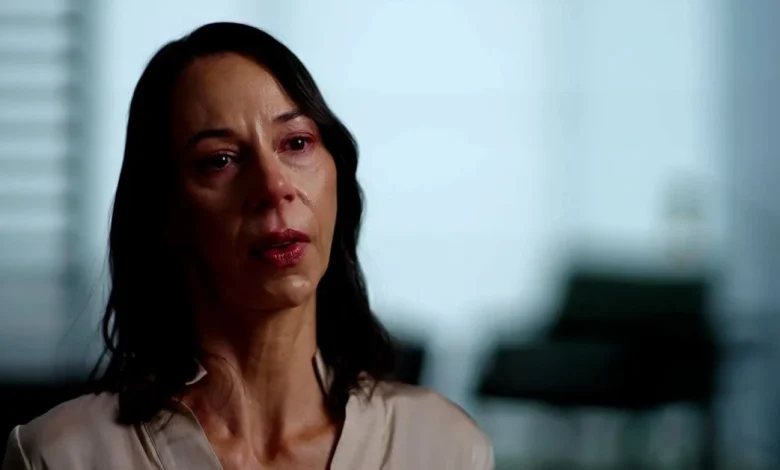Bree thought jaw surgery would solve her problems. Instead, it led to a world of pain

When Bree started suffering sporadic pain in her jaw, she was told by oral and maxillofacial surgeon Doctor George Dimitroulis that surgery was her only option.
He recommended a procedure known as temporo-mandibular joint (TMJ) replacement surgery.
The TMJ connects the jaw to the skull and if damaged can cause pain and stiffness and make it hard to eat and drink. Much like a knee replacement, a surgeon can take a bad joint out and implant a prosthetic.
Bree was a patient of Dr George Dimitroulis. (60 Minutes)
But Bree says Dimitroulis didn’t tell her he had a financial stake in the implant.
He invented the prosthetic and it was made by a company he founded, Maxoniq.
Dimitroulis was essentially able to profit twice from the operation, charging for both the surgery and the implant.
“There was never a mention of that,” Bree said.
But, there should have been. Failing to disclose a potential conflict of interest is against the guidelines set out by the Medical Board of Australia.
If you ask Dr Gary Bouloux, a world-leading expert in TMJ surgery, that disclosure is of the utmost importance.
“It tends to reduce a certain amount of bias that you might otherwise have, and enables the patient, I think, probably to make a more informed decision,” he told 60 Minutes.
Dr Gary Bouloux is a world-leading expert in TMJ surgery. (60 Minutes)
The implant invented by Dimitroulis was a 3D-printed device, supposedly custom-made for a perfect fit. It was approved by the Therapeutic Goods Administration (TGA) in 2016, after only 12 test cases.
“I asked him about the risks. I asked him about if anyone had been unhappy, if anyone had made complaints,” Bree told 60 Minutes.
“He said no to all of those…”
Loose screws
Bree is one of 11 patients 60 Minutes spoke to, who say they’ve had a terrible experience with Dimitroulis and the implant.
Amy was experiencing ongoing problems with her jaw and after some minor procedures, the doctor recommended TMJ replacement surgery.
Like Bree, Amy says the surgeon didn’t disclose his financial stake in the implant.
But none the wiser, she went ahead.
She had surgery on the right-hand side of her face in 2017, and the left side a few months later. Instead of her pain improving though, Amy says it got worse.
“I was living on liquids,” she told 60 Minutes.
“Everything tasted like metal and it just felt like I was being poisoned from the inside out.”
“I was pretty much bedridden.” (60 Minutes)
Amy also felt like the implant, which was supposed to be custom-made, didn’t fit.
“I showed [Dimitroulis] the X-ray with the loose screws and he said, ‘Oh, there might be a couple of loose screws, but that’s not a big deal, I can put new screws in it’.”
But the screws were a big deal – and Amy wasn’t the only patient who had problems with them.
Chloe had TMJ replacement surgery on the right side of her face in 2017 and did see some brief improvement. But after she had the left side done the next year, she knew something was wrong.
“And my constant nagging led [Dimitroulis] to go ‘Fine, we’ll do another scan’ and ‘Oh, well maybe the screws aren’t right’,” she said.
Chloe needed a third surgery so Dimitroulis could replace the screws on the right side of her face. But when she showed her husband, who’s a mechanic, a post-operative scan, he thought the screws on the left side didn’t look right.
“He’s a mechanic. So how has this surgeon, who’s supposed to be at the top of his field, missed something that’s so critical?” she said.
Industry standard
Bouloux has never used the implant invented by Dimitroulis because there’s another one available with a much better track record. With that device, which he’s used on more than 1000 patients, he says failing screws are virtually unheard of. In fact, Bouloux says the complication rate for the implant he uses is exceedingly low – below 1.5 per cent.
The usual complication rate for TMJ surgery is very low. (60 Minutes)
“For the average patient who hasn’t had a prior joint replacement, who doesn’t have osteomyelitis or some other pathology of the bone, I’ve never seen a screw failure,” Bouloux told 60 Minutes.
“The vast majority of patients do exceedingly well with reduction in pain, improved function and improved quality of life.”
But the numbers aren’t so good for the device created by Dimitroulis. An article he co-authored in 2021 admitted 13.9 per cent of patients had problems with the implant over a five-year period.
Under investigation
In 2018, Jodie went to see Dimitroulis, suffering severe pain and arthritis in her jaw.
He put implants in both sides of her face, but immediately after the operation, she knew something was wrong.
“Before I even got back to my room, the right side had dislocated,” she told 60 Minutes.
She needed two more operations to try to get the implants to sit correctly. Jodie was mortified when she found out some of the screws holding her implants in place were loose.
In the end, it wasn’t Dimitroulis, but another surgeon, who replaced the screws. But seven years on, she’s still suffering.
Jodie was a patient of Dimitroulis in 2018. (60 Minutes)
“Any time I go to eat or drink … I get severe nerve pain – both sides,” she said.
“And that’s been non-stop since this surgery.”
Jodie didn’t want anyone else to end up like her, so in 2018, she made an official complaint.
Three years later, the regulator, AHPRA, made damning findings.
Dimitroulis’ conduct amounted to “unsatisfactory professional performance” and posed “an ongoing risk to the health and safety of the public”.
He was ordered to “undergo education” and have an “audit of his practice” but he was allowed to keep operating.
Legal action
While AHPRA was investigating Jodie’s complaint, Amy was also having problems with the screws in her implant.
In 2020, Dimitroulis finally agreed to remove the implants. But she couldn’t believe what he said after the operation.
“He handed me a referral to go and see a different surgeon and said, ‘Prove I ever put a joint in your f—ing head’,” she said.
“I think he realised that he was in a lot of trouble.”
The surgeon was right to suspect this was going to become an even bigger problem for him.
Amy is now suing for medical negligence, and she’s not the only one.
Her lawyer, Shari Labi from Slater and Gordon, is representing 13 of his former patients.
Shari Labi from Slater and Gordon is representing 13 of Dimitroulis’ former patients. (60 Minutes)
Bree says she had to move away from inner-city Melbourne to the West Australian bush after the surgery, because she can’t tolerate noise.
“I actually do feel that my life ended that day of the surgery,” she told 60 Minutes.
Last November, as the lawsuits against him were mounting, Dimitroulis decided to stop practising.
Dimitroulis ignored our request for an interview. Although he’s given up operating, he still delivers medical presentations. 60 Minutes tracked him down in Adelaide as he was arriving to give a speech for the peak body of oral and maxillofacial surgeons.
He made no comment.
60 Minutes tracked Dimitroulis down in Adelaide. (60 Minutes)
If you ask some of the surgeon’s former patients, it’s not good enough.
“Nobody should be able to do that to people,” Amy told 60 Minutes.
“I wouldn’t wish it on my worst enemy,” Chloe said.
“It’s been one hell of a ride.”
Statement from a spokesperson for the Australian Health Practitioner Regulation Agency (APHRA)
Ahpra takes all allegations against health practitioners seriously and with a focus on preventing future harm.
While strict laws around privacy and confidentiality limit what we can say about specific matters or individuals, Ahpra considers all notifications to determine whether regulatory action is required and what form it should take. This process includes gathering information from notifiers and practitioners, working with the National Boards and other regulators, and assessing any current or future safety risks as well as the available controls.
We can confirm that a notification about Dr Dimitroulis resulted in the National Board taking regulatory action by placing restrictions on his registration. These conditions — made public at the time — compelled Dr Dimitroulis to undertake further education and an audit of practice in response to concerns about clinical record-keeping, informed consent, and working within multidisciplinary teams.
Dr Dimitroulis currently holds non-practising registration.
We are unable to comment further. Anyone with concerns about a practitioner is encouraged to contact Ahpra.
Statement from a spokesperson for the Therapeutic Goods Administration
The main components of the devices authorised for supply under Australian Register of Therapeutic Goods (ARTG 276176) are custom-made medical devices – custom-made surgical guides and custom-made implantable components. Custom-made medical devices are made for a particular person, at the request of a health professional, to match the anatomical or physiological features, or pathological condition, of an individual. Custom-made medical devices have particular requirements – see the TGA website at: Understanding regulation of custom-made medical devices | Therapeutic Goods Administration (TGA) for more details – but are normally exempt from needing TGA approval. In this case, the system approved under ARTG 276176 in 2016 also includes non-custom-made surgical screws, so TGA approval was required specifically for the screws. The surgical screws in this system were approved by the TGA in 2011 based on appropriate European regulatory certification that remains current.
ARTG 380818 is for an “export only” product, not approved for supply in Australia, and that is not custom-made.
ARTG 276176 was subject to conditions requiring the sponsor to provide the TGA with information about any adverse events and complaints annually for the first three years. The sponsor met those conditions.
ARTG 276176 covered a category of product: “Prosthesis, internal, joint, temporomandibular, total” with custom-made components and non-custom-made screws.
New models of the system within this category did not require separate TGA approval.
Since 2011, the TGA has received 21 Device Incident Reports (DIRs) in relation to this device. Details of these DIRs can be found in the publicDatabase of Adverse Event Notifications (DAEN)using the ARTG number 276176.
No therapeutic good is risk free. The work of the TGA is based on applying scientific and clinical expertise to decision making to ensure that the benefits to consumers outweigh any risks associated with the use of medicines, medical devices and other therapeutic goods.
Once included in the ARTG, sponsors and manufacturers have ongoing obligations to ensure their devices meet the relevant safety, quality and performance requirements throughout the device lifecycles (Understanding your post-market responsibilities for medical devices | Therapeutic Goods Administration (TGA)). This includes the reporting of adverse events.
The TGA applies a risk-based approach on post-market surveillance functions including monitoring adverse events and complaints reported to the TGA, conducting investigations and reviews and facilitating market actions where appropriate to address any new or emerging issues with medical devices. This approach also considers the proportion of patients who experience an adverse event compared to patients who did not.
In response to TGA investigations into to reports of loose screws causing device dislocation and revision surgery, in mid-2021, following consultation with the TGA, Maxoniq Pty Ltd issued a Hazard Alert for its TMJ Total Joint Replacement System. Summary details of this market action are available in the publicly accessible and searchable Database for Recalls, Product Alerts and Product Corrections, using the following “TGA Action ID” as the search parameter – RC-2021-RN-01348-1.
Statement from a spokesperson for Epworth HealthCare
Dr George Dimitroulis retired from surgical practice at Epworth HealthCare in 2024. He has not performed any procedures at Epworth since that time and is no longer credentialed to practise at any Epworth hospital.
The device developed by Dr Dimitroulis, the TMJ total joint replacement system, has not been used at Epworth since 2024.
Epworth HealthCare understands that some patients have experienced distress or complications following surgery with Dr George Dimitroulis. We recognise how deeply these experiences can affect people’s lives.
Epworth remains committed to the highest standards of patient care and clinical governance. We are continually focused on promoting safety, transparency and trust in everything we do.
Statement from a spokesperson from St Vincent’s Hospital Melbourne
Dr Dimitroulis has not worked at St Vincent’s Hospital Melbourne since 2020.
The hospital is aware of legal actions that are under way concerning Dr Dimitroulis and is unable to provide further comment while those proceedings are before the Court.
Watch the full episode of 60 Minutes on 9Now.





